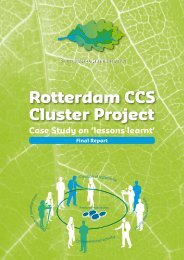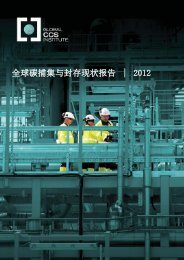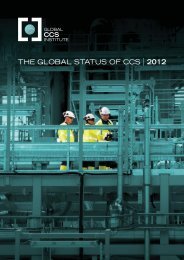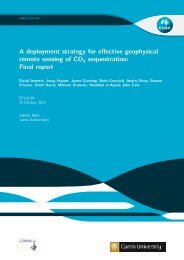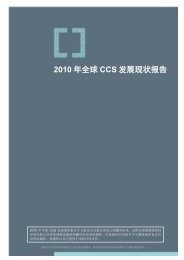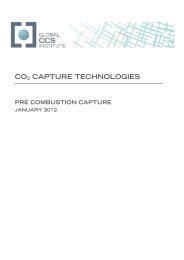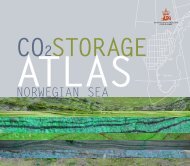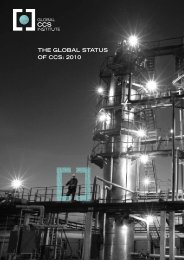Perceptions of CO2 Report - Global CCS Institute
Perceptions of CO2 Report - Global CCS Institute
Perceptions of CO2 Report - Global CCS Institute
- No tags were found...
Create successful ePaper yourself
Turn your PDF publications into a flip-book with our unique Google optimized e-Paper software.
change. Knowledge <strong>of</strong> both the properties <strong>of</strong> CO 2 and its uses had varying results in terms <strong>of</strong> theirinfluence on <strong>CCS</strong> implementation option perceptions. Knowledge that air contains CO 2 wasnegatively correlated with support for implementation in one’s neighbourhood; while knowledge <strong>of</strong>the use <strong>of</strong> CO 2 in fizzy drinks was positively related to all implementation options.It is also interesting to note that respondents who indicated that they had an awareness <strong>of</strong> <strong>CCS</strong>,but limited knowledge <strong>of</strong> it, were more favourable to the implementation options <strong>of</strong>fered comparedto those who had either low or high levels <strong>of</strong> knowledge about <strong>CCS</strong>. Perceiving <strong>CCS</strong> as risky had asubstantial negative impact, and perceiving <strong>CCS</strong> as a necessary climate change mitigationstrategy had a substantial positive impact. This conforms with the existing research (Itaoka, Saito,& Akai, 2004) suggesting that levels <strong>of</strong> awareness <strong>of</strong> both the risk associated with <strong>CCS</strong> and itspotential benefits largely explain peoples’ level <strong>of</strong> acceptance <strong>of</strong> <strong>CCS</strong> technology andimplementation.8.3 How do CO 2 knowledge and perceptions relate to <strong>CCS</strong> knowledgeand perceptions?Research results strongly suggest that the key factor affecting misperceptions <strong>of</strong> <strong>CCS</strong> wasmisperceptions about CO 2 : almost all misperceptions about CO 2 were correlated to misperceptionsabout <strong>CCS</strong>. It was found that respondents’ level <strong>of</strong> misunderstanding <strong>of</strong> CO 2 was related to howrisky they perceived <strong>CCS</strong> to be. Therefore, a person’s level <strong>of</strong> accurate understanding <strong>of</strong> CO 2characteristics directly influences his or her understanding <strong>of</strong> <strong>CCS</strong> as a technology. As would thenbe expected, provision <strong>of</strong> information about CO 2 properties was positively correlated to therespondents’ displaying a more correct understanding <strong>of</strong> <strong>CCS</strong> (see section 5.3.1 for additionaldiscussion <strong>of</strong> the influence <strong>of</strong> information).As with knowledge, impressions <strong>of</strong> CO 2 were reflected in overall impressions <strong>of</strong> <strong>CCS</strong>. For example,respondents who saw CO 2 as useful strongly tended to perceive <strong>CCS</strong> as also more useful.Perceiving CO 2 as useful and dangerous led to the belief that <strong>CCS</strong> was also useful and dangerous.In fact, perceiving CO 2 as dangerous was one <strong>of</strong> the strongest predictors <strong>of</strong> perceiving <strong>CCS</strong> asdangerous. Knowledge <strong>of</strong> where CO 2 comes from influenced perceptions <strong>of</strong> whether <strong>CCS</strong> was auseful and mature technology. As may have been expected, the belief that CO 2 is related toclimate change resulted in perceptions <strong>of</strong> <strong>CCS</strong> as more useful.Interestingly, after respondents received a short introduction to <strong>CCS</strong>, their perceptions <strong>of</strong> thetechnology also played a role in determining their perceptions <strong>of</strong> CO 2 —an effect in the reversedirection from the main focus <strong>of</strong> this paper. For example, those who received information aboutCO 2 ’s behaviour during <strong>CCS</strong> perceived the gas as less useful, but not more dangerous. This isinteresting from the perspective <strong>of</strong> communicating about CO 2 and <strong>CCS</strong> because it shows that <strong>CCS</strong>communication efforts may affect public opinion towards CO 2 , as well as vice versa.8.3.1 WHAT ARE THE EFFECTS OF PROVIDING INFORMATION?Effects on CO 2 perceptionsAfter receiving information packages on <strong>CCS</strong>, participants gave a similar pattern <strong>of</strong> responses onhow they perceived CO 2 , but more participants had formed an opinion either towards a morepositive or a more negative opinion. The information packages had relatively straightforwardinfluences. Respondents who received information about the characteristics and effects <strong>of</strong> CO 2became generally more positive about the gas, tending to report seeing it as more useful, clean,and safe. The analysis provided some surprising outcomes as well. Those respondents whoUnderstanding how individuals perceive carbon dioxide | 45




